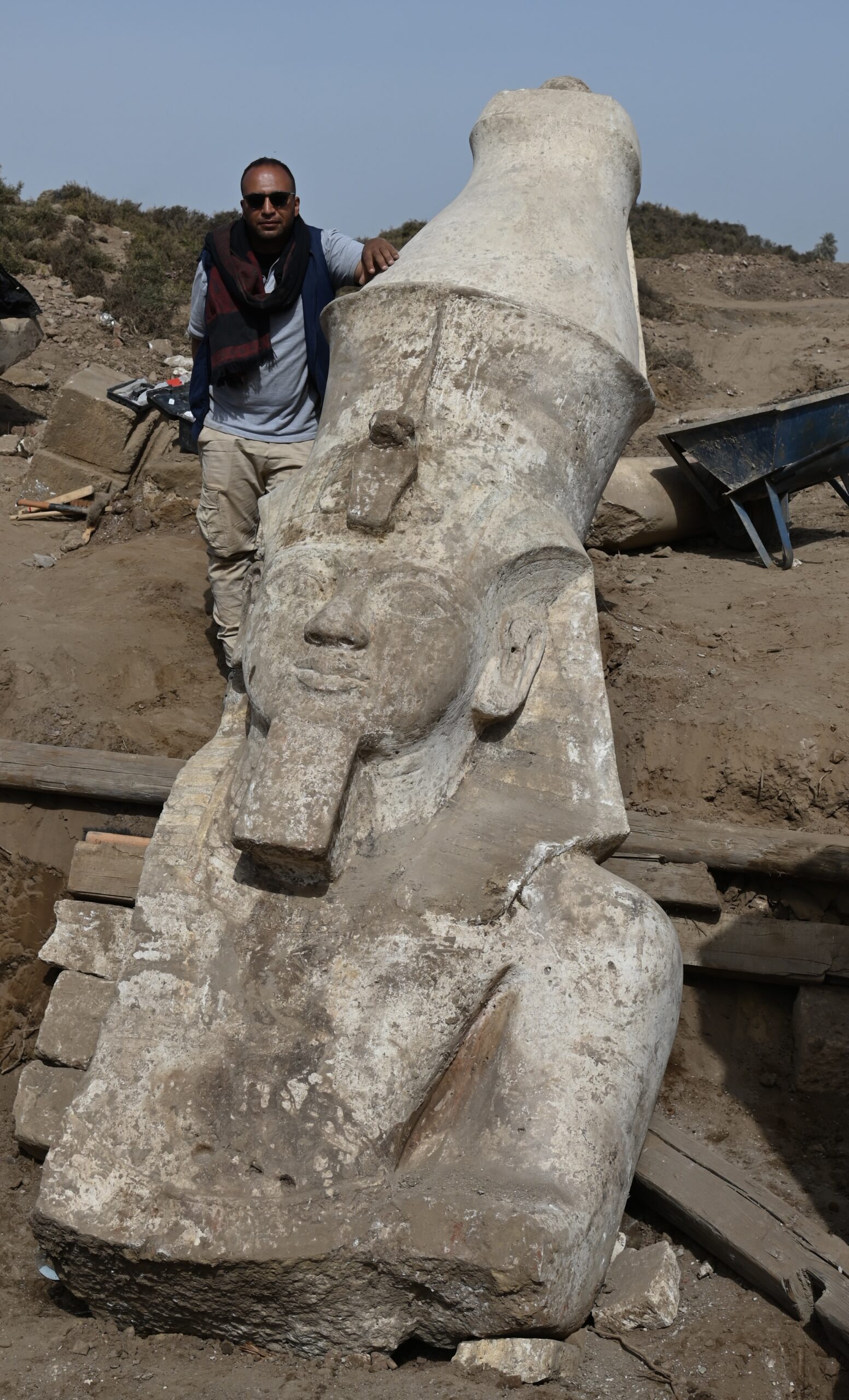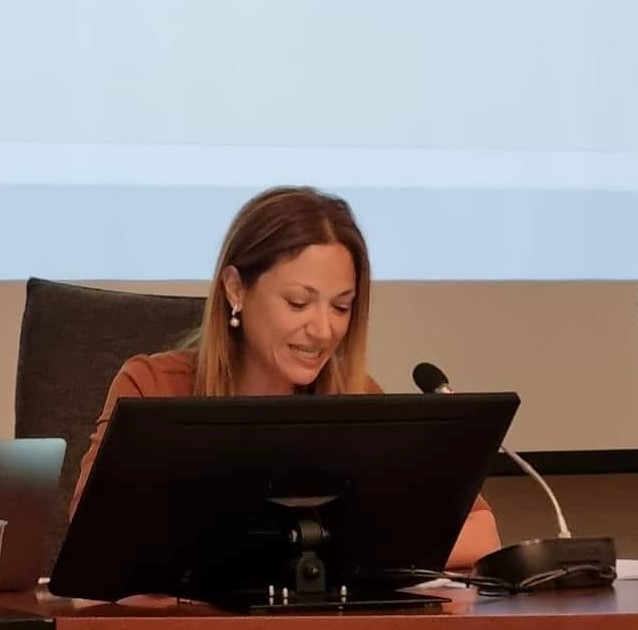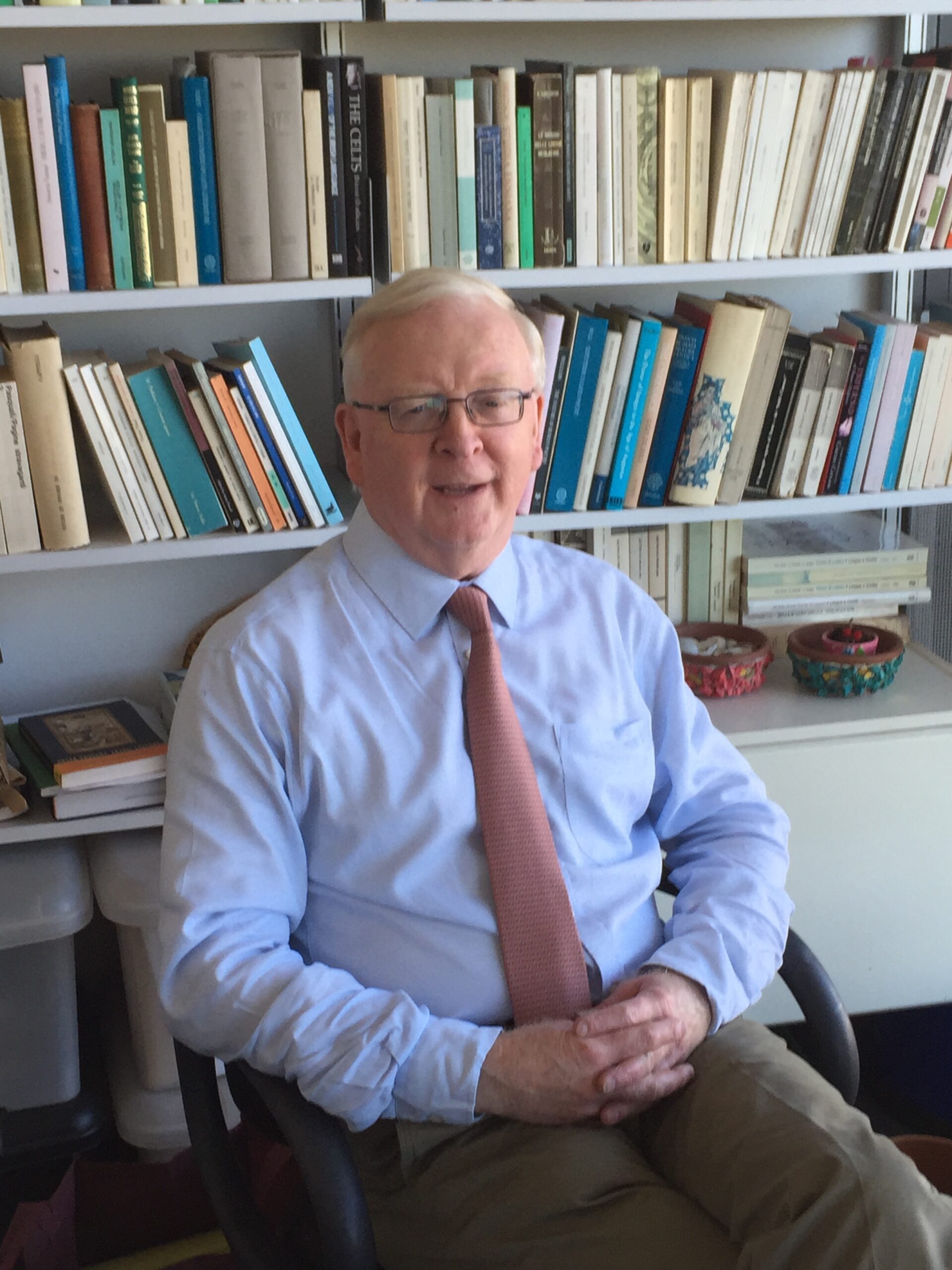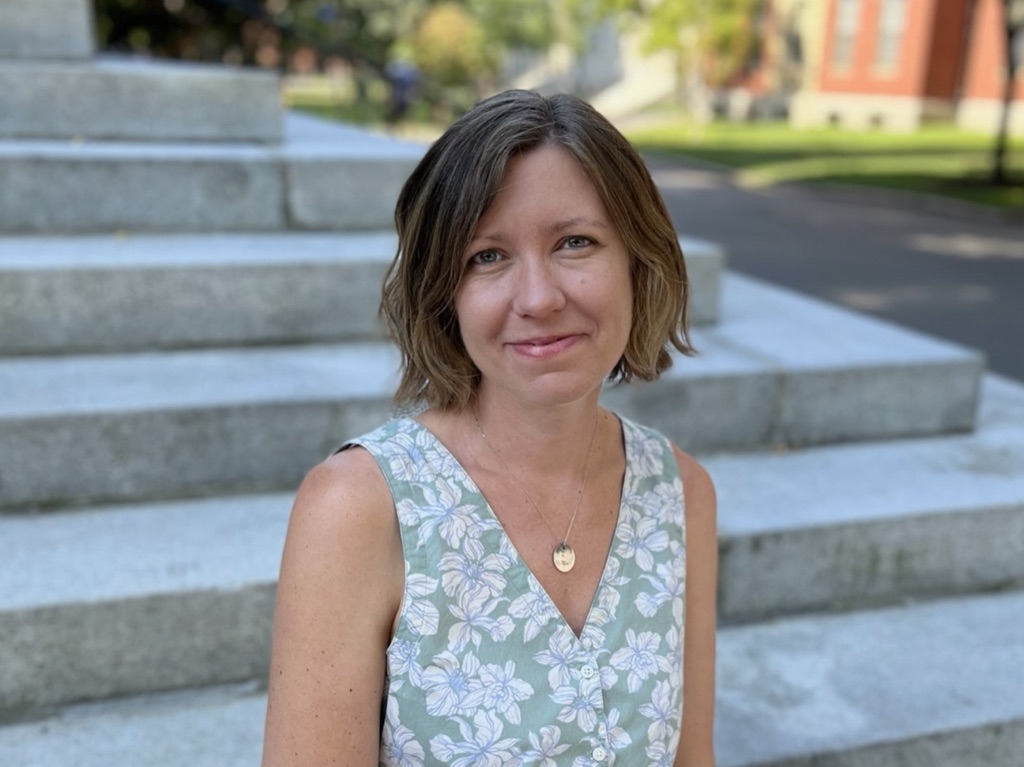Background
In 2022, a team of archaeologists at the necropolis of Philadelphia in Egypt, led by Basem Gehad of the Egyptian Ministry of Antiquities, unearthed a papyrus that contained almost 100 mostly lost lines by Athenian tragedian Euripides. Yvona Trnka-Amrhein, Assistant Professor of Classics at the University of Colorado Boulder, identified the text as Euripides’ Polyidos. She brought in her colleague, John Gibert, Professor of Classics and expert in Greek Drama, to help edit the text. Together they determined that the papyrus also contained Euripides’ Ino. On June 13 and 14, 2024, when their first edition of the papyrus was complete and in the publication pipeline, Gehad, Gibert, and Trnka-Amrhein convened a team of experts at the Center for Hellenic Studies to explore its many dimensions further.
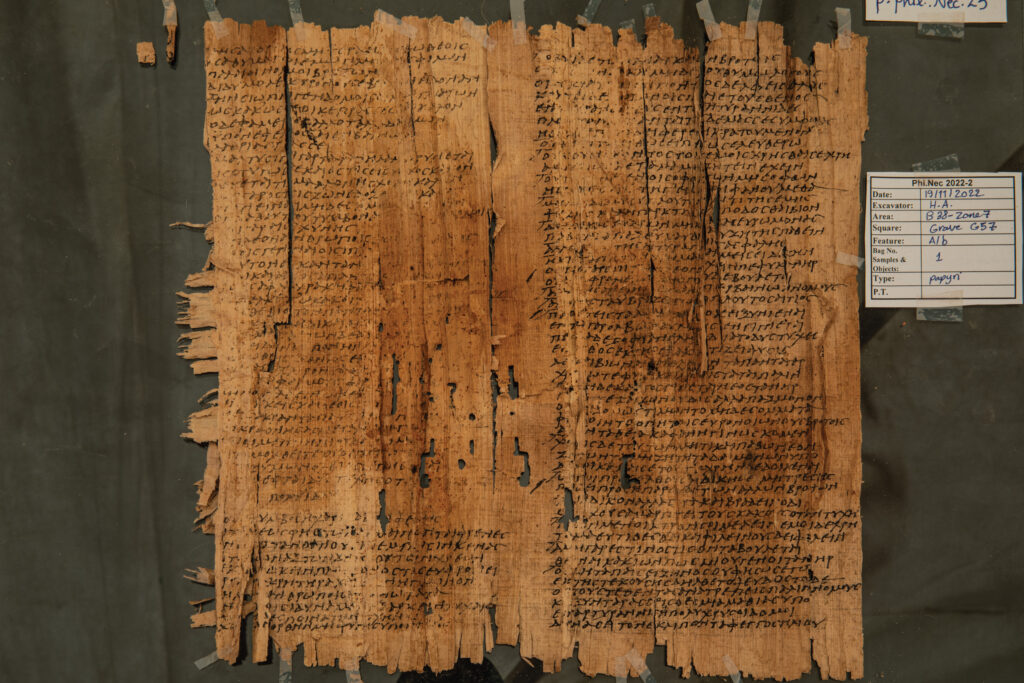
While the preparation for publication of the conference proceedings continues, many participants have made time-sensitive contributions to understanding the new text, which the organizers present in two forms below.
1. Repertory of Conjectures
The following presents all suggested improvements to the text that came to the notice of the editors before publication of the first edition. Please consult the Editors’ Note that prefaces the repertory for guidance in using it.
Repertory of Conjectures (28 August 2024)
2. Pre-prints
Each pre-print bears a date stamp and will not be updated on this site. The conference organizers have given participants free rein to post whatever they like without editorial intervention. The form their contributions take in the eventual volume may differ, but you may consider the pre-prints in the public domain and therefore citable.
Luigi Battezzato, “Earth, Zeus, and Revenge: The text and the nature of the new Euripides papyrus” (22 August 2024)
James Diggle, “Further Thoughts on the Text of P. Phil. Nec. 23” (14 August 2024)
Laura Carrara, “Polyidos, Ixion — or Both? A Tantalizing Puzzle Between Direct and Indirect Tradition” (26 January 2025)
Ioanna Karamanou, “The Agon in Polyidos” (28 August 2024)
Donald J. Mastronarde, “P. Phil. Nec. 23 and Euripides as a Resource for Teaching and Practicing Rhetoric” (25 August 2024)
Chiara Meccariello, “Greek Tragedy in Roman Egypt between Text and Performance: P. Phil. Nec. 23v as an Anthology of Actor’s Parts” (28 August 2024)
More on the Papyrus
Publication
As of August 27, 2024, the first edition of the papyrus has been published in Zeitschrift für Papyrologie und Epigraphik (vol. 230, pp. 1–40). Please check your academic library for access, though ZPE makes the tables of contents of its forthcoming and recently published volumes available here.
Symposium
On September 14, 2024 11:00 a.m. – 5:00 p.m. MDT (GMT/UTC-6) the University of Colorado Boulder will present the 2024 Fountain Symposium, entitled Greek Myths from Egyptian Sands: Discovering the New Euripides. The symposium, which will be livestreamed, will introduce the discovery of the papyrus and explore its contexts in archaeology, literature, mythology, and vase painting. The CU department of classics will be adding additional resources here.
Conference Participants
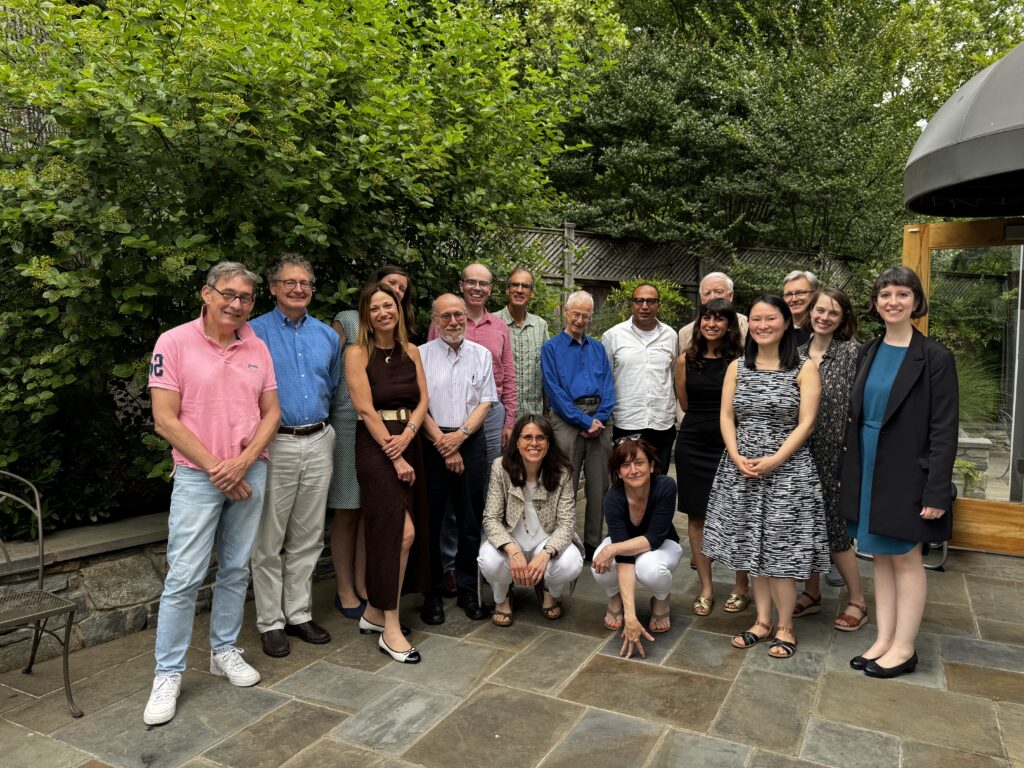
|
Luigi Battezzato,
|
Luigi Battezzato is Professor of Greek literature at the Scuola Normale Superiore, Pisa. He is the author of a book on Homer (Leggere la mente degli eroi: Ettore, Achille e Zeus nell’Iliade, Edizioni della Normale, Pisa 2019), a commentary on Euripides’ Hecuba (Cambridge University Press, Cambridge 2018), a book on linguistics and rhetoric in Greek tragedy (Linguistica e retorica della tragedia greca, Edizioni di Storia e Letteratura, Rome 2008, second edition 2018), and a monograph on Euripides (Il monologo nel teatro di Euripide, Pubblicazioni della Scuola Normale Superiore, Pisa). His other publications deal with problems in the history of Greek literature and culture, Greek metre and language, textual criticism and history of classical scholarship. |
|
Laura Carrara,
|
Laura Carrara studied Classical Philology at the University of Pisa and at the Scuola Normale Superiore di Pisa; she earned her doctoral Degree at the Ca’ Foscari University in Venice with a thesis dedicated to the fragmentary plays by Aeschylus, Sophocles and Euripides about the myth of the Corinthian seer Polyidus (published in Rome, 2014). She then moved to Germany, joining the University of Tübingen and the Heidelberg Academy for Humanities and Sciences as a member of several cooperative research projects mostly devoted to Late Antique and Byzantine literature and concerning natural catastrophes, oracles, and chronicles. In 2019, while serving as invited guest professor for Classical Philology at the University of Dresden, she was awarded a state fellowship by the Italian Ministry for Education and Research and went back to the University of Pisa, where she is now Associate Professor for Greek Language and Literature at the Department of Philology, Literature and Linguistics. In recent years, she has published widely on Greek Drama, including a new monograph on fragmentary satyric and ‘prosatyric’ plays (Il nome e il genere, Edizioni Ca’ Foscari, Venice 2024). In Spring 2025, she will be the next T.B.L. Webster Fellow at the Institute of Classical Studies in London. |
|
Lyndsay Coo,
|
Lyndsay Coo is Senior Lecturer in Ancient Greek Language and Literature at the University of Bristol, where she is also the current Education Director for the School of Humanities. Her research focuses on tragedy and satyr drama, particularly Sophocles and the lost and fragmentary works, and she is co-editor, with Anna Uhlig, of Aeschylus at Play: Studies in Aeschylean Satyr Drama (BICS 62.2, 2019) and, with Patrick Finglass, of Female Characters in Fragmentary Greek Tragedy (Cambridge, 2020). |
|
James Diggle,
|
James Diggle is Emeritus Professor of Greek and Latin in the University of Cambridge and a Life Fellow of Queens’ College. He was University Orator, 1982-1993. He is a Fellow of the British Academy and Corresponding Member of the Academy of Athens. He was appointed CBE (Commander of the Order of the British Empire) in 2023. His main publications are Euripides: Phaethon (1970), (with F. R. D. Goodyear) Flavii Cresconii Corippi Iohannidos Libri VIII (1970), (with F. R. D. Goodyear) The Classical Papers of A.E. Housman (1972), The Oxford Classical Text of Euripides (3 vols., 1981-1994), Studies on the Text of Euripides (1981), The Textual Tradition of Euripides’ Orestes (1991), Euripidea: Collected Essays (1994), Cambridge Orations, 1982-1993: A Selection (1994), Tragicorum Graecorum Fragmenta Selecta (1998), Theophrastus: Characters (Cambridge Classical Texts and Commentaries 2004, and Cambridge Greek and Latin Classics 2022), (with R. Bittlestone and J. Underhill) Odysseus Unbound: The Search for Homer’s Ithaca (2005). He is Editor in Chief of The Cambridge Greek Lexicon (2021). Forthcoming publications are a revised edition of vol. 2 of the OCT of Euripides, and Last Thoughts on Euripides: a Companion to the Revised Edition of the Second Volume of the OCT. |
|
Patrick Finglass,
|
P. J. Finglass is Henry Overton Wills Professor of Greek at the University of Bristol. His most recent book, Euripides and the Myth of Perseus: Two Lost Greek Tragedies Illuminated by a New Papyrus (2024), is published in the De Gruyter series Sozomena; he is currently working on Sappho and Alcaeus. The Corpus of Lesbian Poetry for Cambridge University Press. Both projects were made possible thanks to a Major Research Fellowship awarded by the Leverhulme Trust. He has published Sophocles (2019) in the series Greece and Rome New Surveys in the Classics; has edited Sophocles’ Oedipus the King (2018), Ajax (2011), and Electra (2007), Stesichorus’ Poems (2014), and Pindar’s Pythian Eleven (2007) in the series Cambridge Classical Texts and Commentaries; has co-edited (with Adrian Kelly) The Cambridge Companion to Sappho (2021) and Stesichorus in Context (2015), and (with Lyndsay Coo) Female Characters in Fragmentary Greek Tragedy (2020); and edits the journal Classical Quarterly, all with Cambridge University Press. |
|
Basem Gehad,
|
Basem Gehad is head of the Central Training Unit at the Egyptian Ministry of Tourism and Antiquities and currently directs excavations at the Philadelphia Necropolis. He has co-directed excavations at Shams el Din and el Bagawat in the Kharga Oasis and currently co-directs the City of the Baboon Project at Hermopolis Magna. He researches the painting and funerary culture of Ptolemaic and Roman Egypt and has co-edited a volume on the Science of Ancient Egyptian Materials and Technologies (2022). He is editing the archaeological reports from the Philadelphia Necropolis Project (Vol. 1 to appear in 2025 and Vol. 2 in preparation) and has recently published on the excavation’s new mummy portraits and gabled-roof coffins. |
|
John Gibert,
|
John Gibert is Professor of Classics at the University of Colorado Boulder, where he arrived in 1992. He has published articles, book chapters, and reviews on a variety of topics, with a focus on archaic and classical Greek poetry, especially drama. His Cambridge “green and yellow” edition of Euripides’ Ion appeared in 2019, and he is also the author of Change of Mind in Greek Tragedy (1995) and co-author (with Christopher Collard and Martin Cropp) of Euripides: Selected Fragmentary Tragedies II (2004). He enjoys being involved in contemporary productions of ancient plays, and he has collaborated with the Denver Center for the Performing Arts and the University of Colorado’s Department of Theatre and Dance. He has served on various editorial boards and as Chair of the Department of Classics. |
|
Ioanna Karamanou,
|
Ioanna Karamanou is Professor of Classics and currently Head of the Faculty of Philology in Aristotle University of Thessaloniki. Her research interests include Greek dramatic fragments (tragic and comic), papyrology and Greek drama reception. She has authored Euripides: Danae and Dictys (De Gruyter 2006), Euripides: Alexandros (De Gruyter 2017), Refiguring Tragedy: Studies in Plays Preserved in Fragments and their Reception (De Gruyter 2019) and most recently Fragmenta Comica 25.2: Diphilus (Vandenhoeck & Ruprecht 2024) as part of the KomFrag project. She is now preparing the next volume of her Diphilus commentary (Fragmenta Comica 25.3). She has edited and co-edited four volumes, including Homeric Receptions across Generic and Cultural Contexts, De Gruyter 2016; and The Agon in Classical Literature, University of London Press 2022, and has published extensively in international peer-reviewed journals and collective volumes. She has participated in five international research projects and is Associate Editor of Trends in Classics Supplementary Volumes (De Gruyter). |
|
Rebecca Lämmle,
|
Rebecca Laemmle (Lämmle) is an Associate Professor in Classics (Greek Literature) at the University of Cambridge, UK and a Fellow of Pembroke College. She has published widely, especially on satyr play (i.a. Poetik des Satyrspiels, Heidelberg 2013, CambridgeGreen & Yellow commentary on Euripides Cyclops, co-ed. with R. Hunter, Cambridge 2020), and comico-satirical traditions in Graeco-Roman antiquity; she currently works on Homer and the ancient reception of Homeric epic. |
|
Donald Mastronarde,
|
Donald Mastronarde is Emeritus Distinguished Melpomene Professor of Classical Languages and Literature at The University of California, Berkeley, where he continues to teach occasionally as Professor of the Graduate School. He was the founding director of the Center for the Tebtunis Papyri and is managing editor of the open-access monograph series California Classical Studies. His Euripidean work has included the Teubner edition of Phoenissae, the Cambridge orange Phoenissae, and the Cambridge green and yellow Medea as well as the monograph The Art of Euripides. For more than a decade he has been working on a more comprehensive open-access edition of the scholia on the Euripidean triad, of which those on Orestes 1–1100 are currently available at EuripidesScholia.org, with the remainder of the Orestes scholia expected to be added in 2025. |
|
Brian McGing,
|
Brian McGing is Regius Professor of Greek Emeritus at Trinity College Dublin. He has written a monograph on Mithridates VI Eupator of Pontus (Leiden 1986) and a study of Polyibus’ Histories (Oxford 2010). He recently completed a six-volume Loeb edition of Appian’s Roman History and has written numerous articles on ancient history. As a papyrologist, he has published the Greek Papyri from Dublin and is currently coordinating the study and publication of substantial documentary rolls from ancient Narmouthis in the Egyptian Fayoum that are now held in Dublin’s Chester Beatty Library. |
|
Chiara Meccariello,
|
Chiara Meccariello is a Lecturer in Classics at the University of Exeter and Co-Director of the Centre for Hellenistic and Later Greek Studies at the same university. After earning a PhD in Greek Philology and Literature from the University of Pisa, she held research and teaching positions at the University of Vienna, Oxford, Göttingen, Cassino and Cambridge. Her research focuses on Greek literary and subliterary papyri, ancient education, Greek drama and mythography. Her publications include the monograph Le hypotheseis narrative dei drammi euripidei. Testo, contesto, fortuna (Rome 2014) and the co-edited volumes The Oxyrhynchus Papyri, volume LXXXI (London 2016) and Uses and Misuses of Ancient Mediterranean Sources: Erudition, Authority, Manipulation (Tübingen 2022). |
|
Douglas Olson,
|
S. Douglas Olson is Distinguished McKnight University Professor in the Department of Classical and Near Eastern Religions and Cultures at the University of Minnesota. He is the author of over 35 books, including a complete critical edition of Athenaeus’ Deipnosophistae for the Teubner series, commentaries on Aristophanes’ Peace, Acharnians, Thesmophoriazusae (with Colin Austin), Wasps (with Zachary Biles) for Oxford and Knights (with Zachary Biles) and Cambridge, and editions and commentaries on the fragments of Eupolis (3 volumes) and Antiphanes (3 volumes) for the Heidelberg Academy Komfrag project, with which he has been closely associated for the last 15 years. He has been awarded numerous national and international grants, including two individual NEH fellowships, a Humboldt fellowship, a research fellowship from the Heidelberg Academy, a FRIAS fellowship, and a Helsinki Collegium fellowship, and is a frequent long-term visitor at the Universities of Bari and Freiburg and at Bilkent University in Ankara. He is currently at work on a translation of Pollux’ Onomasticon (forthcoming 2026 from CUP) and a new text and translation of Harpocration’s Vocabulary of the Ten Orators. |
|
Yvona Trnka-Amrhein,
|
Yvona Trnka-Amrhein is Assistant Professor of Classics at the University of Colorado Boulder. She works on Greek literature of the Hellenistic and Roman Imperial periods, literary papyrology, the culture of Ptolemaic and Roman Egypt, and the reception of Greek narrative literature in Armenian historiography. Her current book project, Portraits of Pharaohs, studies the historical fictions of Greco-Roman Egypt, such as The Sesonchosis Novel, The Alexander Romance, and The Oracle of the Potter. She is also editing a volume of the Philadelphia Necropolis papyri with Basem Gehad. Together she and Gehad direct The City of the Baboon Project, an excavation and conservation project at Hermopolis Magna in Middle Egypt. |
|
Naomi Weiss,
|
Naomi Weiss is Professor of the Classics at Harvard University. She has published widely on archaic and classical Greek poetry and performance culture, especially drama. She is the author of The Music of Tragedy: Performance and Imagination in Euripidean Theater (University of California Press 2018) and Seeing Theater: The Phenomenology of Classical Greek Drama (University of California Press 2023). She has co-edited two volumes: Genre in Archaic and Classical Greek Poetry: Theories and Models (Brill 2020, with Margaret Foster and Leslie Kurke) and Music and Memory in the Ancient Greek and Roman Worlds (Cambridge University Press 2021, with Lauren Curtis). With Anna Uhlig, Weiss is also series editor of the “Cambridge Elements” series, Ancient Greek and Roman Performance and Drama. She is currently working with Sarah Olsen on a new commentary on Euripides’ Orestes for Cambridge University Press. |






